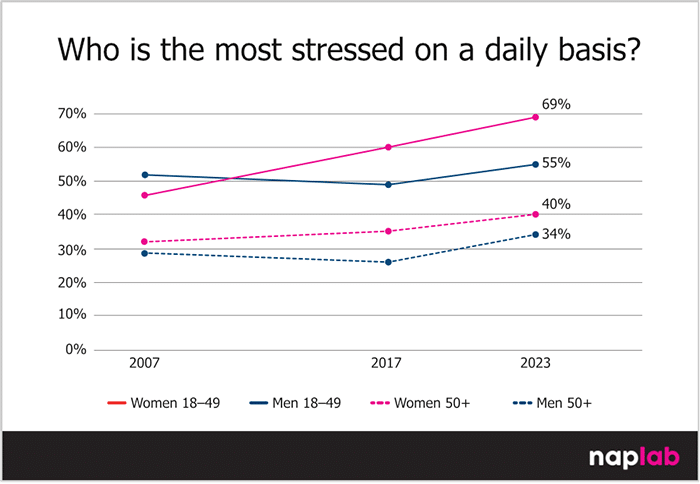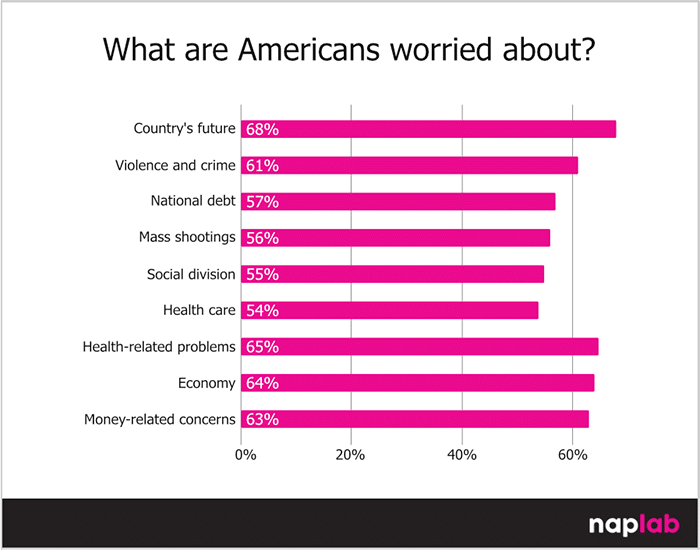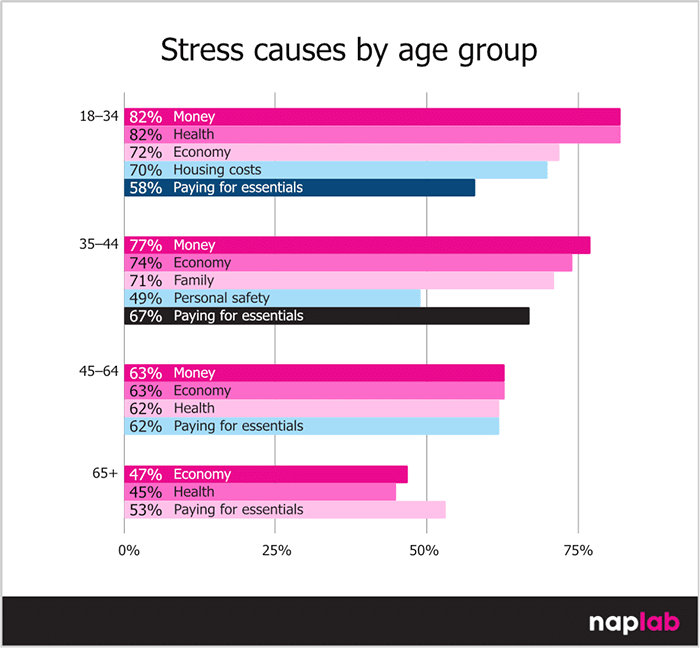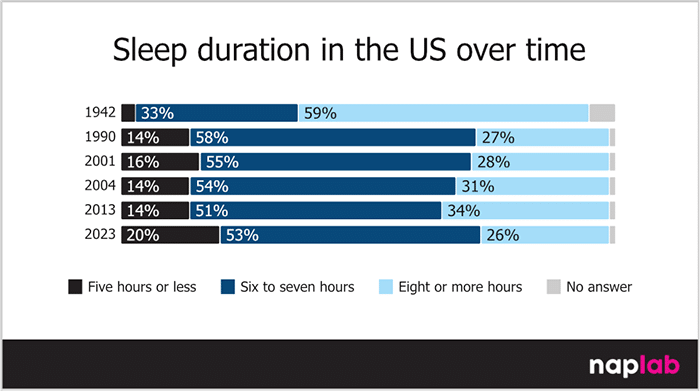Report highlights. Over half (57%) of Americans say getting more sleep would help them feel less stressed.
- Only 36% of women say they get enough sleep, compared to 48% of men.
- 49% of Americans often feel stressed.
- 69% of women between the ages of 18–49 say they frequently feel stressed in their daily lives.
- Adults who feel stressed typically get about one hour less of sleep per night than those who do not describe themselves as stressed.
- 33% of adults with lower stress levels describe their sleep quality as excellent or very good, whereas only 8% of those experiencing high stress describe their sleep as such.
Related reports include Sleep Statistics 2025.
How many Americans are stressed?
Stress continues to affect a significant portion of Americans, and younger adults report higher levels than older age groups.
- About half (49%) of Americans said they frequently experienced stress in 2023, up slightly from 44% in 2017.
- In 2023, 53% of women reported feeling stressed daily, compared to 45% of men. These numbers were 49% for women and 39% for men in 2017.
- Looking at women by age group, 69% of younger women (aged 18–49) say they frequently feel stressed in their daily lives in 2023, compared to only 40% of women aged 50 and above.
- A similar pattern is seen among men, but only 55% of younger men (aged 18–49) report being frequently stressed, and only 34% of men aged 50 and above experience frequent stress.

How many people are stressed globally?
Large portions of the global population across different countries, professions, and age groups report high levels of stress.
- 31% of adults worldwide said stress was the leading health concern in their country.
- According to a 2023 survey, 65% of adults in Northern Cyprus, 62% in Israel, and 59% in Nigeria reported feeling stressed the previous day, the highest numbers from the top 20 stressed-out countries.
- 79% of people around the world report experiencing stress at varying levels of intensity.
- Those who report feeling stressed on a daily basis most often include full-time employees (82%) and students (83%).
- Work is the main source of stress for 24% of people worldwide, and more men (27%) than women (20%) report job-related stress.
- 21% of people are worried about income and lack of money. Both men and women are equally affected.
- Stress related to family is more common among women, 22% of whom cite it as a top concern, compared to 15% of men.
Stress reasons by region
- In Africa, 26% of people report financial stress, followed by 25% in both the Americas and Asia-Pacific regions.
- Europeans are most stressed about health issues and life changes rather than money.
- In the Middle East and Northern Africa, 14% of people report war as a source of stress, while 12% are stressed about family concerns.
Why are Americans so stressed?
A majority of US adults report feeling stressed about key national and personal issues.
- 68% of American adults say worrying about the country’s future causes them stress, followed by violence and crime (61%), national debt (57%), mass shootings (56%), social division (55%), and health care (54%).
- 65% of Americans cite health-related problems as a source of stress, followed by 64% who say it’s the economy and 63% who point to money-related concerns.
- 83% of US employees experience job-related stress, and this stress affects the personal lives of 54% of US employees.
- Work-related stress is estimated to contribute to 120,000 deaths per year in the US.

Stress causes by age group
- In 2023, 82% of adults aged 18 to 34 said they were most stressed about health and money.
- Among adults aged 35 to 44, 77% reported money as a top concern, followed by 74% who cited the economy.
- The 35–44 age group also saw a 10% rise in chronic health issues and mental health conditions over the four years between 2019 and 2023, growing from 48% to 58%.
- Like the 35–44 age group, those 45–64 also reported an increase in chronic medical and mental health conditions over four years, though the rise between 2019 and 2023 was only half that (5%) of younger Americans, increasing from 68% to 73%.
- Adults aged 45 to 64 listed money (63%), the economy (63%), and health (62%) as their primary concerns.
- For adults aged 65 and older, the leading concerns were the economy (47%) and health (45%).
- Concern for the economy among adults 65 and older rose by 11% between 2019 and 2023.
Stress reasons by life stage
- In 2023, 63% of parents with children under 18 reported having a chronic illness, up from 56% in 2019.
- 79% of parents said money causes them significant stress, while 77% identified family responsibilities as the source.
- 68% of single-adult households reported money as a significant stressor in 2023, followed by economy (63%), housing costs (57%), and personal safety (44%).
- 51% of retired adults reported the economy as a significant source of stress in 2023, up considerably from 38% in 2019.
- In another study, 75% of high school students and half of middle schoolers say they regularly experience stress due to schoolwork.

How does sleep affect stress?
Stress and sleep are closely linked, and higher stress levels often lead to shorter, lower-quality rest.
- According to a 2013 study, when adults don’t get enough sleep, 21% say they feel more stressed. That number rises to 45% among those who already rate their stress levels as high (8 to 10 on a 10-point scale).
- Adults with higher stress levels average 6.2 hours of sleep per night, while those with lower stress levels get about 7.1 hours—nearly an hour more.
- Among adults with lower stress levels, 33% describe their sleep quality as excellent or very good, compared to just 8% of those experiencing high stress.
- Individuals with high sleep reactivity, meaning their sleep is easily disrupted by stress, have a sleep efficiency of 81%, compared to 89% for those less affected.
- High-reactivity sleepers take an average of 23 minutes to fall asleep, compared to 9 minutes for low-reactivity sleepers.
- High-reactivity sleepers take 36 minutes to reach deep, consistent sleep, compared to 16 minutes for low-reactivity sleepers.
- Highly reactive sleepers also show greater daytime sleepiness, averaging 13 minutes on the Multiple Sleep Latency Test versus 11 minutes for others.
- According to a 2022 survey, nearly 90% of Americans said they lost sleep due to concerns about the economy or their health.
- Financial stress was a major factor for 87% of Americans, who reported sleep loss over money—including 1 in 5 who said it happens frequently—and 86% who said health worries kept them up at night.
- Students with stress were 1.79 times more likely to report poor sleep quality than those without stress. (source)
How many Americans report getting the sleep they need?
Only 26% of Americans report sleeping for over 8 hours in 2023, down from 34% in 2013 and 59% in 1942.
- 36% of women say they get enough sleep, compared to 48% of men.
- Among age groups, 55% of Americans aged 65 and older say they get enough sleep, followed by 42% of those aged 18 to 29, 40% of those aged 50 to 64, and 34% of adults aged 30 to 49.
- In 2023, 51% of older men reported getting enough sleep. Younger men (46%) and older women (44%) were nearly equal in saying they get adequate rest.
- Only 27% of women aged 18–49 report getting enough sleep.

How much sleep do people in various stages of life get?
Sleep needs and habits change significantly throughout life. Factors such as pregnancy, parenting, age, and lifestyle all play a role in how much rest people actually get.
Pregnant women
Pregnancy often brings significant changes to sleep patterns, and many women experience disruptions such as insomnia, snoring, and other related conditions.
- At least half (50%) of all pregnant women experience insomnia during pregnancy.
- On average, people in their second trimester of pregnancy get about 7.5 hours of sleep each night.
- Pregnant women experiencing stress were about 3.4 times more likely to report poor sleep quality than those who weren’t under stress. (source)
- About 33% of pregnant women said their sleep was disrupted due to stress. (source)
- Between 38% and 55% of pregnant women reported poor sleep, with higher rates occurring in late pregnancy compared to early and mid-pregnancy. (source)
- Up to half (50%) of pregnant women snore, and the snoring often becomes more frequent or intense in the third trimester.
- 1 in 5 pregnant women are estimated to be affected by obstructive sleep apnea.
- Up to a third of women suffer from restless legs syndrome during the final trimester of pregnancy.
Parents
Single parents get 10%–12% less sleep than other adults, and mothers get less sleep than fathers.
- 43% of single parents get fewer than seven hours of sleep each night, compared to 33% of adults in two-parent households and 31% of those without children.
- Mothers with a low sleep profile averaged 5.74 hours of sleep per night when their child was 3 months old and 5.9 hours between 12 and 24 months. Those with an average sleep profile reported around 7.3 hours of sleep at both time points.
- New mothers lose an average of 62 minutes of sleep, while new fathers lose about 13 minutes.
- New parents’ sleep quality and duration drop sharply after a child is born, and these effects can persist for up to six years.
Infants
Sleep plays a vital role in early development, and infants need long hours of rest, especially premature babies, who often sleep for the majority of the day.
- Infants under the age of one typically need between 12 and 16 hours of sleep daily, including nap time.
- Premature babies may sleep for as much as 90% of the day.
Children and teenagers
Only 69% of school-aged children, including only 28%–42% of teenagers, are getting enough sleep.
- Between 20% and 30% of children struggle with either falling asleep or staying asleep.
- 10% to 50% of children aged 3 to 6 report occasional nightmares that affect their sleep duration and quality.
- Around 31% of parents and guardians report their school-aged children aren’t getting enough sleep.
- 58% of middle schoolers and 72% of high schoolers sleep less than the advised durations for their age group.
- Teenagers typically get between 7 and 7.25 hours of sleep each night, falling short of the recommended 9 to 9.5 hours.
- Lack of sleep in teens is caused by biological changes, early school days, homework, extracurriculars such as sports, socializing online or in person, and playing video games.
- Teens between the ages of 13 and 19 get 40 to 50 minutes less sleep per night than they should, on average.
- Adolescents delay bedtime by an average of 16 minutes for every 30 minutes spent playing video games.
- Between 2009 and 2021, the percentage of high school students who didn’t get enough sleep increased from 69% to 77%.
- In 2021, nearly 70% of 9th graders and 83.5% of 12th graders reported getting less sleep than recommended.
Elderly
Sleep problems are common in older adults, many of whom experience ongoing issues that often go undiagnosed.
- 20.3% of people aged 65 and above report having trouble staying asleep.
- An estimated 40% to 70% of older adults experience ongoing sleep issues, up to half of which go undiagnosed.
How to manage stress and improve sleep
Simple daily habits and lifestyle changes can go a long way in lowering stress levels and promoting better sleep.
- Set aside 20 to 25 minutes each day for gentle breathing exercises, meditation, and progressive muscle relaxation.
- Regular physical activity, including yoga, can help relieve stress and support better sleep. However, aim to finish workouts at least two hours before bedtime.
- Connecting with family and friends can help to manage and reduce stress.
- Practice re-framing negative thoughts and apply emotion-focused coping techniques to better handle daily challenges.
- Cut back on screen time, especially before bed. Excessive smartphone use has been linked to higher stress levels, according to a 2021 study.
- Take a few minutes to journal before bed and write down any stressful thoughts to help calm your mind.
Sources
- Americans sleeping less, more stressed
- 100+ sleep statistics
- Share of adults worldwide who viewed stress as the biggest health problem in their country from 2018 to 2024
- Leading countries/region worldwide based on stress experienced in the previous day in 2023
- Stress levels rise around the world
- Study: How mother and infant sleep patterns interact during the first two years of life
- Stress in America 2023: A nation recovering from collective trauma
- Workplace stress: Overview
- Stress and sleep
- The impact of stress on sleep: Pathogenic sleep reactivity as a vulnerability to insomnia and circadian disorders
- Financial and health-related worries keeping Americans up at night, survey shows
- Pregnancy & sleep: Common issues & tips for sleeping
- Sleeping while pregnant: Second trimester
- Sleep in adolescents
- Stress in teens and young adults
- Schools shift as evidence mounts that later start times improve teens’ learning and well-being
- Sleepless nights? Try stress relief techniques
- Tips to reduce stress and sleep better
- Sleep difficulties in adults: United States, 2020
- Sleep in the aging population
- 16 simple ways to reduce stress



